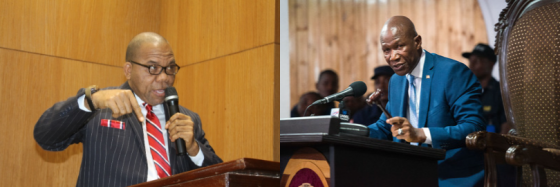Liberia: House Passes Own Version of Bao Chico Deal

(L-r) Senate Pro-Tempore Albert Chie and
Speaker Bhofal Chambers of the House of Representatives.
... Sends back to Senate
The Plenary of the House of Representatives has ratified its own version of the BAO CHICO mineral development agreement, authorizing the Chinese company to engage in the extraction of iron ore in Gbarpolu County.
The House took the route of rejecting an early version of the same agreement from the Senate on grounds that the upper house violated Article 34d(i) of the Constitution while ratifying the “US$500 million” deal.
Article 34d(i) of the 1986 Constitution states that “all revenue bills, whether subsidies, charges, imports, and other financial bills, shall originate in the House of Representatives; but the Senate may propose or concur with amendments as on other bills.”
And after weeks of argument over Article 34d(i), the House by "headcount" of 22 persons, constituting the majority of its members in session, voted unanimously in favor of the agreement following a Joint Committee report from the Committees on Investment and Concession, Judiciary and Lands, Mines and Energy.
The House, voting for its own version, re-echoed that Article 34d(i) of the 1986 Constitution clearly states that all revenue bills… shall originate in the House of Representatives and that concession agreement are revenue bills. But the Senate upon being notified of the House action voted unanimously to sue the House for the “wrongful” interpretation of Article 34d(i).
A source at the House of Representatives told the Daily Observer that the House Committee on Lands, Mines, and Energy has already held public hearings on the proposed agreement and that the Joint Committee report is expected to follow soon. However, there is no indication that BAO CHICO has provided an Environmental and Social Impact Assessment for the proposed concession area.
Debating the House’s action last month, the Senate complained that the action was demeaning and bordered on their integrity, and planned to seek the Supreme Court’s opinion to put this matter to rest.
However, it is unclear if the Senate has acted on the threats, as there is no suit record at the Supreme Court of such and whether they will back it with non-concurrence.
BAO CHICO
The Class A mining agreement is for an initial term of 25-years, and investment of US$500 million, aimed at improving the country’s economy, creating job opportunities, and scholarships for citizens as part of its support to the Government’s Pro-Poor Agenda for Prosperity and Development (PAPD).
But the Chinese company and the government are yet to state the total number of jobs the concession is expected to create. It is expected to bring in an annual social contribution of US$300,000 and, after five years, escalate to US$500,000 until the end of the term; and an additional US$10,000 for Gbarpolu County as General Education Funding, while US$50,000 will be provided annually as Scientific Reserves Fund.
According to the agreement, BAO CHICO Resource is expected to be taxed on its net taxable income at a rate not exceeding 25 percent; pay royalties on all its mineral product sales and transfers for iron ore, at a rate of 4.5 percent determined in accordance with Section 703 of the Revenue Code and for other minerals, as provided.
Also, upon the ratification of the agreement by the Legislature and signed into law by the President, the company is expected to pay a signature fee of US$3 million, payable according to the following schedule: that US$1.5 million within 30 business days of the effective date; (ii) US$1 million on the first anniversary of the effective date; and (iii) US$0.5 million on the second anniversary of the effective date
The BAO CHICO agreement, which was submitted by President Weah in October comes three years after the Weah administration announced a swap deal with China that will see Liberia exchange its natural resources for US$2.5 billion as financing for the country’s development.
At a press conference then, Finance Minister Samuel Tweah disclosed that the agreement with China was an “Investment facility – a sort of monetization that would leverage the country’s natural resources for hard currency – and that resources extraction would commence after conducting a feasibility study to determine the exact value.
“Let me be very clear on it, this is not a loan. It is an investment facility; a framework entered into between the China Road and Bridge Corporation and the Government of Liberia under the FOCAC arrangement to unveil US$2.5 billion for financing the country’s development over the next five years,” Min. Tweah disclosed after he had returned from China along with President Weah and others attending the Forum on China Africa Cooperation (FOCAC) in 2018.
The ratified MDA by the legislature, although in a different version comes just a few years after a similar agreement with China Union, which was valued for US$2.6 billion agreement, did not go as planned.
The 25-year China Union agreement was expected to generate 3,000 to 4,000 jobs with an additional 15,000 indirectly, but the only remains of such promise is the remains of idle machines gathering rust after the company shut down operation in 2014 due to Ebola. The China Union agreement was signed under the administration of former President Ellen Johnson-Sirleaf.
Other Social Services
Meanwhile, as per the submitted agreement, which the House and Senate have passed, a different version called for BAO CHICO to provide either directly or indirectly access to housing for the employees and contractors, which conforms to the universal standard of living.
The Chinese company also expects to construct, operate, and maintain during its operations, health facilities to ensure the availability in the production area of 24-hour emergency medical treatment, care, and attention.
